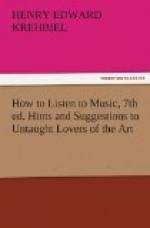“Beethoven (Dr. Brown is speaking of the Sonata in D, op. 10, No. 3) begins with a trouble, a wandering and groping in the dark, a strange emergence of order out of chaos, a wild, rich confusion and misrule. Wilful and passionate, often harsh, and, as it were, thick with gloom; then comes, as if ‘it stole upon the air,’ the burden of the theme, the still, sad music—Largo e mesto—so human, so sorrowful, and yet the sorrow overcome, not by gladness but by something better, like the sea, after a dark night of tempest, falling asleep in the young light of morning, and ’whispering how meek and gentle it can be.’ This likeness to the sea, its immensity, its uncertainty, its wild, strong glory and play, its peace, its solitude, its unsearchableness, its prevailing sadness, comes more into our minds with this great and deep master’s works than any other.”
That is Beethoven.
[Sidenote: Apollo and the critic—a fable.]
[Sidenote: The critic’s duty to admire.]
[Sidenote: A mediator between musician and public.]
[Sidenote: Essential virtues.]
Once upon a time—it is an ancient fable—a critic picked out all the faults of a great poet and presented them to Apollo. The god received the gift graciously and set a bag of wheat before the critic with the command that he separate the chaff from the kernels. The critic did the work with alacrity, and turning to Apollo for his reward, received the chaff. Nothing could show us more appositely than this what criticism should not be. A critic’s duty is to separate excellence from defect, as Dr. Crotch says; to admire as well as to find fault. In the proportion that defects are apparent he should increase his efforts to discover beauties. Much flows out of this conception of his duty. Holding it the critic will bring besides all needful knowledge a fulness of love into his work. “Where sympathy is lacking, correct judgment is also lacking,” said Mendelssohn. The critic should be the mediator between the musician and the public. For all new works he should do what the symphonists of the Liszt school attempt to do by means of programmes; he should excite curiosity, arouse interest, and pave the way to popular comprehension. But for the old he should not fail to encourage reverence and admiration. To do both these things he must know his duty to the past, the present, and the future, and adjust each duty to the other. Such adjustment is only possible if he knows the music of the past and present, and is quick to perceive the bent and outcome of novel strivings. He should be catholic in taste, outspoken in judgment, unalterable in allegiance to his ideals, unswervable in integrity.
PLATES
[Illustration: PLATE I
VIOLIN—(CLIFFORD SCHMIDT)]
[Illustration: PLATE II
VIOLONCELLO—(VICTOR HERBERT)]




